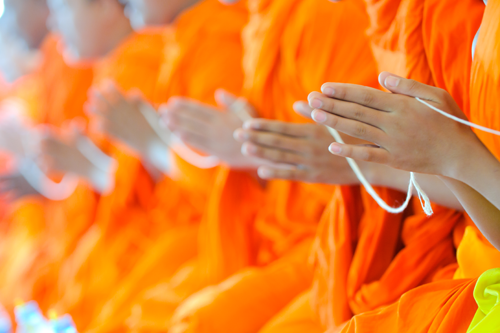 I go back about 35 years in the do-good PR and communications field and have spent much of the last decade working to build awareness of specific ways contemplative practice can facilitate deep social and environmental change. So I’m heartened by the surge of mainstream media coverage of mindfulness in the past year or so—and at the same time concerned about what it’s saying (and not saying).
I go back about 35 years in the do-good PR and communications field and have spent much of the last decade working to build awareness of specific ways contemplative practice can facilitate deep social and environmental change. So I’m heartened by the surge of mainstream media coverage of mindfulness in the past year or so—and at the same time concerned about what it’s saying (and not saying).
For one thing, according to conventional wisdom from long before the days of the Internet, by the time a trend story appears on the cover of Time or Newsweek, the trend is already over. The February 3, 2014, Time cover story on “The Mindful Revolution” was typical of most of the recent media coverage of mindfulness in that it focused on how meditation offers practical, secular benefits for health and well-being, helps reduce stress, and helps boost performance at work. This is true, and it’s great that the major media are covering it.
But it’s not exactly revolutionary. There’s a large body of research on this going back decades. For example, Jon Kabat-Zinn’s work on Mindfulness Based Stress Reduction, a staple of research and of coverage about mindfulness, dates back to the 1970s.
I would like to see the secular mindfulness movement tap its deeper potential for social change. That would mean touting not only how contemplative practices cultivate individual well-being and performance but also how they train qualities like ethics, compassion, and empathy—qualities that connect individuals to communities and animate not just personal but social change.
There’s danger in the media reporting on how meditation can make you happier/healthier/stronger/ faster/smarter/richer, even if in some ways it’s true. One of the first Tibetan Buddhist masters to teach in America, Trungpa Rinpoche, coined the term “spiritual materialism” to describe using meditation to create temporary peaceful states of mind as an escape from suffering, while leaving an ego-based view of self and what makes us happy unchallenged. He argued this would lead to worse suffering in the long term. What would he have thought about Nightline anchor Dan Harris’s recent book on meditation, 10% Happier, or this Bloomberg story, “To Make a Killing on Wall Street, Start Meditating”?
It’s not hard to see how the media’s focus on mindfulness as a health and performance enhancer invites controversy and push-back. One critic calls it “McMindfulness” and worries “the secular mindfulness movement is leaving out the bulk of the Buddhist presentation of mindfulness.” In February protesters crashed a Wisdom 2.0 conference in San Francisco, interrupting a panel on “3 Steps to Build Corporate Mindfulness the Google Way,” and got into a tussle on stage. They were raising a different issue, faulting Google for touting mindfulness while causing displacement and gentrification in the Bay Area, but the scene illustrated the potential for conflict over putting the words “corporate” and “mindfulness” together. (Full disclosure: I’ve helped promote Wisdom 2.0 and other events on workplace mindfulness, including an upcoming New York retreat on the Google mindfulness training, “Search Inside Yourself.” )
If you’re working on a mindfulness practice now, you’re not just helping yourself. You’re also watering the seeds of an explosive social movement that can transform some of the most intractable issues we face. And that’s revolutionary.
But I would like to see the secular mindfulness movement tap its deeper potential for social change. That would mean touting not only how contemplative practices cultivate individual well-being and performance but also how they train qualities like ethics, compassion, and empathy—qualities that connect individuals to communities and animate not just personal but social change.
That’s urgent because empathy is declining in our society. A body of research shows that medical students lose empathy as they go through training and especially as they start practicing. College students’ self-reported empathy has been dropping at an accelerating rate since 1980.
Meanwhile such research as Barbara Frederickson’s work on positive emotions and Tania Singer’s work on compassion finds that meditation enhances connection, empathy, and other socially active qualities. Applied in rigorous, evidence-based ways, this aspect of contemplative practice is helping physicians and caregivers, aid workers, teachers, environmental advocates, and others on the high-stress front lines of social issues avoid burnout and survive and thrive in their work. Across the U.S., it’s enabling not only the hip and upscale but also prison inmates, foster kids, and students in tough K-12 schools modify their stress responses, behaviors, and lives for the better.
That’s how I hope and believe the mindfulness trend story is trending. Its next logical phase is not about just what mindfulness can do for me but also how we as a society benefit. If you’re working on a mindfulness practice now, you’re not just helping yourself. You’re also watering the seeds of an explosive social movement that can transform some of the most intractable issues we face. And that’s revolutionary.



